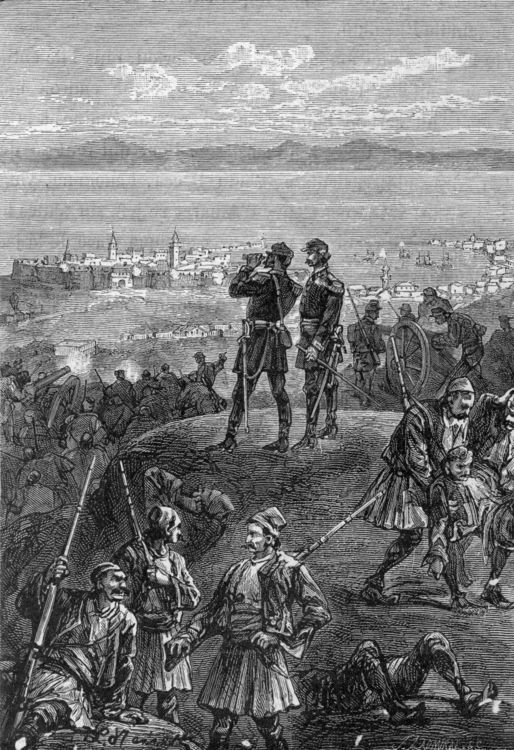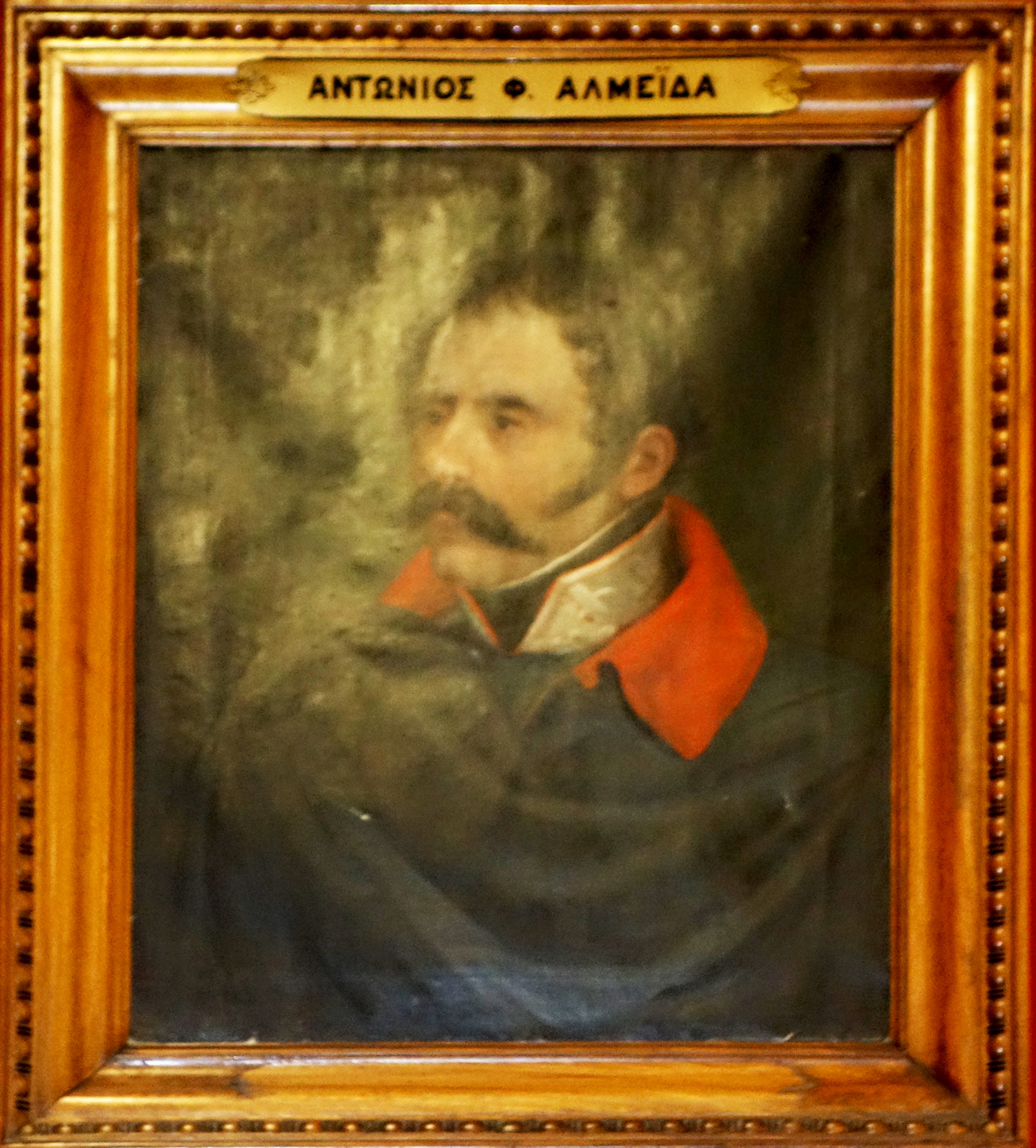Chios expedition on:
[Wikipedia]
[Google]
[Amazon]

 The Chios expedition (
The Chios expedition (
 Α serious problem that Fabvier was facing was the order from the French admiral
Α serious problem that Fabvier was facing was the order from the French admiral

 The Chios expedition (
The Chios expedition (Greek
Greek may refer to:
Greece
Anything of, from, or related to Greece, a country in Southern Europe:
*Greeks, an ethnic group.
*Greek language, a branch of the Indo-European language family.
**Proto-Greek language, the assumed last common ancestor ...
: Εκστρατεία της Χίου) was an unsuccessful attempt of the regular Greek army and irregular military units for the recapture of Chios
Chios (; el, Χίος, Chíos , traditionally known as Scio in English) is the fifth largest Greek island, situated in the northern Aegean Sea. The island is separated from Turkey by the Chios Strait. Chios is notable for its exports of masti ...
island during the final stages of the Greek War of Independence. Chios had participated in the Greek uprising against the Ottoman Empire
The Ottoman Empire, * ; is an archaic version. The definite article forms and were synonymous * and el, Оθωμανική Αυτοκρατορία, Othōmanikē Avtokratoria, label=none * info page on book at Martin Luther University) ...
, but had been captured and its population massacred by the Ottoman fleet in 1822.
Historical background
In the last months of 1827, as independence loomed, the Greek rebels launched simultaneous military operations from Peloponnese to Chios,Crete
Crete ( el, Κρήτη, translit=, Modern: , Ancient: ) is the largest and most populous of the Greek islands, the 88th largest island in the world and the fifth largest island in the Mediterranean Sea, after Sicily, Sardinia, Cyprus, ...
, eastern and western Greece. This happened because they were very concerned that large areas would remain outside the prospective Greek state, even areas that had revolted and had suffered many hardships during the previous stages of the War of Independence.
In 1827, Chian merchants who lived in Syros
Syros ( el, Σύρος ), also known as Siros or Syra, is a Greek island in the Cyclades, in the Aegean Sea. It is south-east of Athens. The area of the island is and it has 21,507 inhabitants (2011 census).
The largest towns are Ermoupoli, An ...
sent letters to the Greek government begging them to undertake an expedition to regain Chios. The newly formed Chian Committee sent a letter to their fellow Chian, Adamantios Korais
Adamantios Korais or Koraïs ( el, Ἀδαμάντιος Κοραῆς ; la, Adamantius Coraes; french: Adamance Coray; 27 April 17486 April 1833) was a Greek scholar credited with laying the foundations of modern Greek literature and a majo ...
, asking him to find basic resources (like water and food) for the campaign. The Vice-gubernatorial Committee that administered Greece until the arrival of Governor Ioannis Kapodistrias
Count Ioannis Antonios Kapodistrias (10 or 11 February 1776 – 9 October 1831), sometimes anglicized as John Capodistrias ( el, Κόμης Ιωάννης Αντώνιος Καποδίστριας, Komis Ioannis Antonios Kapodistrias; russian: � ...
ordered Sir Richard Church to assign the task of recovering Chios to Charles Nicolas Fabvier
Charles Nicolas Fabvier ( el, Κάρολος Φαβιέρος, Karolos Favieros) (10 December 1782 – 15 September 1855) was an ambassador, general and French member of parliament who played a distinguished role in the Greek War of Independence.
...
in August 1827. At first, Fabvier didn't act, but soon began organizing an expeditionary force of 600-700 men, mostly from the regular army, as well as a small artillery force (4 field guns, 6-7 siege guns, 3 mortars). The force was complemented by 200 cavalry (although less than a quarter actually had horses), which did not arrive until November, and over a thousand irregulars from Central Greece and Chian refugees.
Initial campaign
The expedition assembled at the island ofPsara
Psara ( el, Ψαρά, , ; known in ancient times as /, /) is a Greek island in the Aegean Sea. Together with the small island of Antipsara (Population 4) it forms the municipality of Psara. It is part of the Chios regional unit, which is part of ...
, near Chios, which likewise had been captured and ravaged by the Ottomans in 1824. The expeditionary force landed on Chios on 17 October, facing the Ottoman garrison of 2,000 men under Yusuf Pasha. The next day, the Greek fleet under Thomas Cochrane offloaded further 5 mortars and 1,000 shells. The Greek expedition had already caused the reaction of the Great Powers, whose admirals in the Aegean on 12 October had issued a proclamation opposing any renewed uprising on Chios. Undeterred, Fabvier defeated the first Ottoman forces that opposed him, forcing them to shut themselves in the medieval Castle of Chios, which he laid siege to. The siege was incomplete, however, as Fabvier lacked a fleet to blockade the fortress from the sea as well.
 Α serious problem that Fabvier was facing was the order from the French admiral
Α serious problem that Fabvier was facing was the order from the French admiral Henri de Rigny
Marie Henri Daniel Gauthier, comte de Rigny (; 2 February 1782 – 6 November 1835) was the commander of the French squadron at the Battle of Navarino in the Greek War of Independence.
Biography
Family
He was a nephew of Baron Joseph Domini ...
to quit and leave. Fabvier replied that he only took orders from the Greek government. On 5 November 1827 he was reinforced by the cavalry under the philhellene
Philhellenism ("the love of Greek culture") was an intellectual movement prominent mostly at the turn of the 19th century. It contributed to the sentiments that led Europeans such as Lord Byron and Charles Nicolas Fabvier to advocate for Greek i ...
Portuguese colonel Antonio Figueira d'Almeida. A few days later the famed mine-digger Konstantinos Lagoumitzis came to the island in order to help undermine the walls of the castle.
At the same time, Fabvier launched raids on the Anatolia
Anatolia, tr, Anadolu Yarımadası), and the Anatolian plateau, also known as Asia Minor, is a large peninsula in Western Asia and the westernmost protrusion of the Asian continent. It constitutes the major part of modern-day Turkey. The ...
n shores, and prepared a large-scale attack on the port of Çeşme
Çeşme () is a coastal town and the administrative centre of the district of the same name in Turkey's westernmost end, on a promontory on the tip of the peninsula that also carries the same name and that extends inland to form a whole with the ...
, in conjunction with a fireship
A fire ship or fireship, used in the days of wooden rowed or sailing ships, was a ship filled with combustibles, or gunpowder deliberately set on fire and steered (or, when possible, allowed to drift) into an enemy fleet, in order to destroy sh ...
attack under Konstantinos Kanaris
Konstantinos Kanaris ( el, Κωνσταντίνος Κανάρης, ; c. 17901877), also anglicised as Constantine Kanaris or Canaris, was a Greek admiral, Prime Minister, and a hero of the Greek War of Independence.Woodhouse, p. 129.
Biog ...
against the ships in port there. In the event, string winds prevented the execution of this operation. A similar raid against the environs of Smyrna
Smyrna ( ; grc, Σμύρνη, Smýrnē, or , ) was a Greek city located at a strategic point on the Aegean coast of Anatolia. Due to its advantageous port conditions, its ease of defence, and its good inland connections, Smyrna rose to promi ...
was thwarted after the brig ''Sotir'' sunk in a storm on 6 January 1828.
Ottoman garrison
On 12 January, the Ottomans launched a strong sortie against the poorly guarded bastion of the Greek siege lines, and soon made rapid progress until stopped by the strong resistance of irregulars under the ''kapetanios'' Gekas, who bought precious time for the intervention of the 2nd Regular Battalion, which drove the Turks back. Fabvier himself, seeing Turkish banners on his trenches, took the 3rd Battalion and recaptured the original bastion the Turks had captured. The Turks lost 240 (according to other sources as many as 524) men, but the victory was not decisive as the blockade remained loose. The new governor, Kapodistrias, sent money and reinforcements to the island and ordered the fleet to assist, but the situation was critical: the Chian Committee had ceased providing pay and supplies to the troops, while the exactions of the irregular fighters exacerbated relations with the locals.Evacuation
Finally, on 27 February 1828, an Ottoman squadron drove away the Greek ships aiding the siege. On the next day, they escorted 3,000 troops from Çeşme across the sea to Chios. The first attempts to land elsewhere on the island were thwarted by the regular Greek troops, forcing the Ottomans to land in the fortress. Their arrival led to the collapse of morale of the Chian population, many of whom fled the island. Fabvier decided to lift the siege and withdraw, and in early March, he and his men were evacuated from the island.References
Sources
* * * {{Greek War of Independence Conflicts in 1827 Conflicts in 1828 1827 in Greece 1828 in Greece Chios 1827 Ottoman Chios Amphibious operations